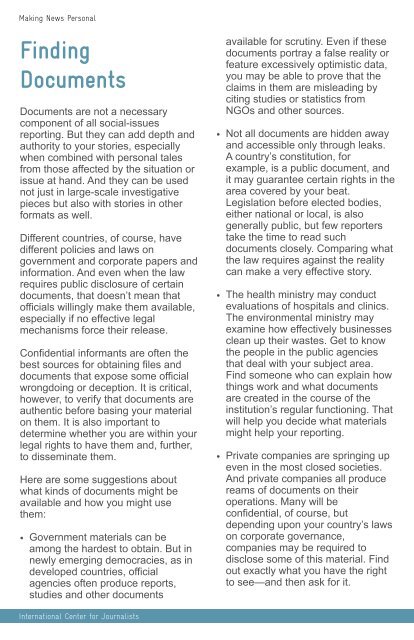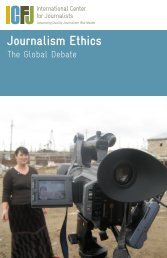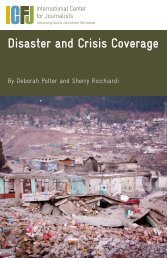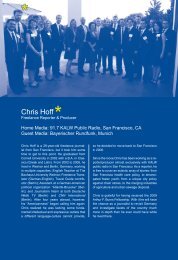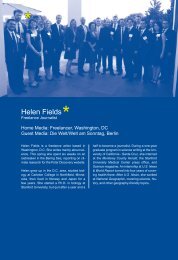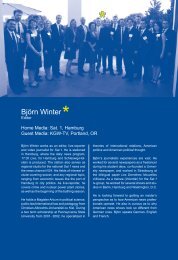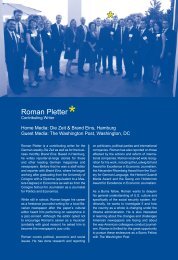Download PDF - International Center for Journalists
Download PDF - International Center for Journalists
Download PDF - International Center for Journalists
You also want an ePaper? Increase the reach of your titles
YUMPU automatically turns print PDFs into web optimized ePapers that Google loves.
Making News Personal<br />
Finding<br />
Documents<br />
Documents are not a necessary<br />
component of all social-issues<br />
reporting. But they can add depth and<br />
authority to your stories, especially<br />
when combined with personal tales<br />
from those affected by the situation or<br />
issue at hand. And they can be used<br />
not just in large-scale investigative<br />
pieces but also with stories in other<br />
<strong>for</strong>mats as well.<br />
Different countries, of course, have<br />
different policies and laws on<br />
government and corporate papers and<br />
in<strong>for</strong>mation. And even when the law<br />
requires public disclosure of certain<br />
documents, that doesn’t mean that<br />
officials willingly make them available,<br />
especially if no effective legal<br />
mechanisms <strong>for</strong>ce their release.<br />
Confidential in<strong>for</strong>mants are often the<br />
best sources <strong>for</strong> obtaining files and<br />
documents that expose some official<br />
wrongdoing or deception. It is critical,<br />
however, to verify that documents are<br />
authentic be<strong>for</strong>e basing your material<br />
on them. It is also important to<br />
determine whether you are within your<br />
legal rights to have them and, further,<br />
to disseminate them.<br />
Here are some suggestions about<br />
what kinds of documents might be<br />
available and how you might use<br />
them:<br />
• Government materials can be<br />
among the hardest to obtain. But in<br />
newly emerging democracies, as in<br />
developed countries, official<br />
agencies often produce reports,<br />
studies and other documents<br />
available <strong>for</strong> scrutiny. Even if these<br />
documents portray a false reality or<br />
feature excessively optimistic data,<br />
you may be able to prove that the<br />
claims in them are misleading by<br />
citing studies or statistics from<br />
NGOs and other sources.<br />
• Not all documents are hidden away<br />
and accessible only through leaks.<br />
A country’s constitution, <strong>for</strong><br />
example, is a public document, and<br />
it may guarantee certain rights in the<br />
area covered by your beat.<br />
Legislation be<strong>for</strong>e elected bodies,<br />
either national or local, is also<br />
generally public, but few reporters<br />
take the time to read such<br />
documents closely. Comparing what<br />
the law requires against the reality<br />
can make a very effective story.<br />
• The health ministry may conduct<br />
evaluations of hospitals and clinics.<br />
The environmental ministry may<br />
examine how effectively businesses<br />
clean up their wastes. Get to know<br />
the people in the public agencies<br />
that deal with your subject area.<br />
Find someone who can explain how<br />
things work and what documents<br />
are created in the course of the<br />
institution’s regular functioning. That<br />
will help you decide what materials<br />
might help your reporting.<br />
• Private companies are springing up<br />
even in the most closed societies.<br />
And private companies all produce<br />
reams of documents on their<br />
operations. Many will be<br />
confidential, of course, but<br />
depending upon your country’s laws<br />
on corporate governance,<br />
companies may be required to<br />
disclose some of this material. Find<br />
out exactly what you have the right<br />
to see—and then ask <strong>for</strong> it.<br />
<strong>International</strong> <strong>Center</strong> <strong>for</strong> <strong>Journalists</strong>


